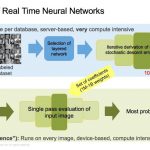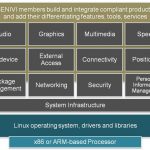Probably the most interesting thing about Neural Networks is how they can be used for complex recognition tasks that we as people can easily perform but we might have a lot of trouble explaining how. One very good example of a problem that Neural Networks can tackle is determining when people are making a fake smile. Intuitively we… Read More
Tag: embedded
HW/SW Interfaces for Portable Stimulus
With growing size and complexity of SoC, the semiconductor community is realizing the growing pain of verification. The cost of SoC verification grows exponentially with design size. Moreover, there is no single methodology for verifying a SoC; multiple engines are used in different contexts through different verification… Read More
Reconfigurable redefined with embedded FPGA core IP
On November 1, 1985, before anyone had heard the phrase field programmable gate array, Xilinx introduced what they called a “new class of ASIC” – the XC2064, with a whopping 1200 gates. Reconfigurable computing was born and thrived around the RAM-based FPGA, whose logic and input/output pins could be architected into a variety… Read More
HLS with ARM and FPGA Technologies Boosts SoC Performance
The way SoC size and complexity are increasing; new ways of development and verification are also evolving with innovative automated tools and environment for SoC development and optimization. IP based SoC development methodology has proved to be the most efficient for large SoCs. This needs collaboration among multiple players… Read More
A Security Idea for EDA / Embedded Design
I’m on a mission to find novel ideas for EDA / embedded design tools. One I have been discussing on and off with a DARPA friend for at least a couple of years is how to grade the security of a hardware design or, more comprehensively, the security of an embedded system including hardware and the software running on the hardware.
This feels… Read More
Quark Adds Muscle to Intel in the IoT World
We have been hearing about Intel’s Quark processor, which is based on its good old Pentium, making waves in IoT world. The CPU core of Quark is said to be the smallest in Intel. It is supposed to be inexpensive and extremely low in power; a perfect combination for IoT devices. The Pentium architecture equips the processor to perform… Read More
SoCs in New Context Look beyond PPA – Part2
In the first part of this article, I talked about some of the key business aspects along with some technical aspects like system performance, functionality, and IP integration that drive the architecture of an SoC for its best optimization and realization in an economic sense. In this part, let’s dive into some more aspects that… Read More
Open Source Software Platform Fuels Automotive Innovation
These days, most of the innovative concepts in our cars are driven by electronics; not only infotainment systems, but also instrument clusters, safety systems including ADAS (Advanced Driver Assistance Systems), information displays, night vision, airbags, backup camera, stability control, and so on. The upcoming connected… Read More
More Test Points are Better
I got really involved in testability back at CrossCheck in the 1990’s when they designed a way for Gate Arrays to have 100% observability without any Design For Test (DFT) requirements on designers. The Japanese Gate Array companies loved this approach and their customers enjoyed the highest test coverage without being… Read More
Tracing Insight into Advanced Multicore Systems
After knowing about the challenges involved in validating multicore systems and domains of system and application level tracing as explained by Don Dingee in his article “Tracing methods to multicore gladness” which is based on the first part of Mentor Embedded multicore whitepaper series, it’s time to take a deeper insight … Read More



